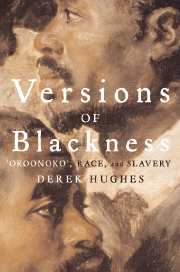Book contents
- Frontmatter
- Contents
- Introduction
- A Note on the Texts
- Chronology
- PART ONE THE MAJOR TEXTS
- PART TWO CONTEXTS: EUROPE, AMERICA, AND AFRICA
- A Short Account of the Destruction of the Indies
- Democrates Secundus
- “Of the Cannibals” and “Of Coaches”
- On Spreading the Gospel Among the Savages
- The English-American his Travail by Sea and Land
- A True and Exact History of the Island of Barbados
- The History of Sir Francis Drake
- Voyage de la France Equinoxiale en l'Isle de Cayenne
- An Exact Relation of the Most Execrable Attempts of John Allin
- The History of the Caribby-Islands
- Histoire Generale des Antilles Habitées par les François
- An Impartial Description of Surinam
- Great Newes from the Barbadoes
- The Negro's and Indians Advocate
- Friendly Advice to the Gentlemen Planters of the East and West Indies
- DISCUSSIONS OF COLONIALISM
- Bibliography
- Index
Friendly Advice to the Gentlemen Planters of the East and West Indies
Published online by Cambridge University Press: 05 June 2012
- Frontmatter
- Contents
- Introduction
- A Note on the Texts
- Chronology
- PART ONE THE MAJOR TEXTS
- PART TWO CONTEXTS: EUROPE, AMERICA, AND AFRICA
- A Short Account of the Destruction of the Indies
- Democrates Secundus
- “Of the Cannibals” and “Of Coaches”
- On Spreading the Gospel Among the Savages
- The English-American his Travail by Sea and Land
- A True and Exact History of the Island of Barbados
- The History of Sir Francis Drake
- Voyage de la France Equinoxiale en l'Isle de Cayenne
- An Exact Relation of the Most Execrable Attempts of John Allin
- The History of the Caribby-Islands
- Histoire Generale des Antilles Habitées par les François
- An Impartial Description of Surinam
- Great Newes from the Barbadoes
- The Negro's and Indians Advocate
- Friendly Advice to the Gentlemen Planters of the East and West Indies
- DISCUSSIONS OF COLONIALISM
- Bibliography
- Index
Summary
Thomas tryon (1634–1703) wrote on a variety of moral, dietary, and other topics, including the virtues of vegetarianism and the nature of dreams. He was a hatter by trade and visited Barbados in connection with his business. Behn published a poem in praise of his The Way to Health, Long Life, and Happiness (1683), which appeared in Miscellany (1685) and, in the same year, in Tryon's The Way to Make All People Rich. In the poem, she praises Tryon for restoring the “Golden Age” and the life of “the Noble Savage.”
Friendly Advice is divided into three parts. Like George Warren and the author of Good Newes, Tryon discusses the plants and fruits of the West Indies, with descriptions of pineapples, plantains, bananas, and other fruit. There follows “The Complaints of the Negro-Slaves against the hard Usages and barbarous Cruelties inflicted upon them,” from which the following extract is taken, and “A Discourse in way of Dialogue between an Ethiopean or Negro-Slave, and a Christian that was his Master in America.” One example of cruelty is of a woman who burned a slave alive for running away.
Whereas the other authors, such as Behn in Oroonoko, describe vegetation with an eye to its commercial potential, Tryon's emphasis is medicinal and moral. Chiefly, he portrays the West Indies as a place where strenuous labour is unnecessary because of the natural fertility of the land. It is, however, unhealthy because of its hot climate.
- Type
- Chapter
- Information
- Versions of BlacknessKey Texts on Slavery from the Seventeenth Century, pp. 349 - 352Publisher: Cambridge University PressPrint publication year: 2007



